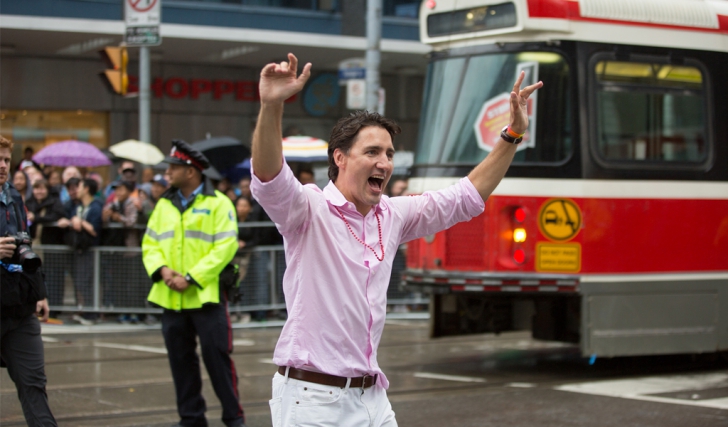The Harper era in Canada is over, as a second wave of Trudeaumania has swept Justin Trudeau’s Liberals into a majority government.
Harper had earned the enmity of the LGBT community over the nearly 10 years he served as prime minister, owing to homophobic outbursts from his caucus members and candidates, his opposition to a trans anti-discrimination bill, his cuts to funding of LGBT service organizations and other real and perceived slights over the years. He conceded defeat as results were still coming in, although he retains his seat in Parliament for the new riding of Calgary Heritage. In a press release, it was announced that he was resigning as leader of the Conservative Party and that a leadership race would begin shortly.

(Justin Trudeau marches in Toronto’s 2015 Pride parade./Photo: Kyle Burton)
By contrast, Trudeau arrives in office as the first Canadian prime minister who has marched in a Pride parade. Expectations are high that Trudeau will bring a different tone to government compared to his predecessor.
Since becoming leader of the Liberal party in 2013, and in the party’s election platform, Trudeau has made several promises to the LGBT community.
Expect the first major milestone to be an end to the gay blood and organ donor ban, which has been in place since the 1980s and was expanded under Harper. The Liberals had been running a petition campaign on their website about this topic since 2014. Ending the ban would require only a regulatory change at Health Canada, and thus could be enacted relatively quickly once a new health minister is appointed and new regulations are drafted.
Trudeau also told Daily Xtra that a Liberal government would bring forward legislation to include trans people in the Canadian Human Rights Act and in the hate crime provisions of the Criminal Code. This may prove tricky as any new legislation would have to pass through the Senate, which blocked the legislation in the last Parliament. Trudeau will be able to appoint 22 new senators upon taking office, but that will still leave him shy of a majority. He’ll need to be certain that the Senate doesn’t block the legislation before introducing it in Parliament.
Given Trudeau’s positive personal stance on the trans rights bill, trans activists may also have an easier time working with the new government to accommodate trans people in the federal government’s areas of responsibility — such as providing for trans-inclusive passports and regulations for housing trans inmates in federal prisons.
The Liberals pledged to replace the Conservatives’ divisive Anti-Terrorism Act (C-51) to curb some of the components that critics say violate Canadians’ Charter rights to expression, association, and protest. Activists will have to keep watch on what the Liberals do with this file.
The new government will also have to deal with the Conservatives’ anti-sex work law, (C-36), which many critics say flies in the face of the Supreme Court ruling that struck down most of Canada’s sex work laws in 2013. While Trudeau voted against C-36 and some of his caucus have spoken against it, Trudeau has been cagey about whether he’d repeal the bill once in office.
It will also remain to be seen whether the new government will equalize the ages of consent for anal and vaginal sex. Such a move would require an act of Parliament. Liberals have never taken a strong stance on this discrimination, despite six provincial superior courts striking down the law as unconstitutional. This may be an area where NDP MPs — particularly Randall Garrison — prod the government.
Beyond legislation and regulation, LGBT Canadians will be looking for a new tone in their relationship with the government. Will Trudeau continue to attend Pride parades in Canada as prime minister, or turn up at LGBT functions? Trudeau has pledged more money for the arts and social programs, but will LGBT groups continue to feel like they’re being targeted for funding cuts? Will Canada push LGBT rights as an important issue in international diplomacy — and if so, will we have more of an impact under this government than under the frequently antagonistic Harper government? Will Canada be more welcoming to LGBT refugees?
The New Democrats had a disappointing election, finishing in third place with just 44 seats and 19.7 percent of the vote. Although this is the second-best result in the party’s history, it’s a crushing blow to a party that had been preparing to take office just a few weeks ago. The party had been pitching itself as the biggest supporter of the LGBT community for several years, but lost by large margins in ridings like Toronto Centre, Vancouver Centre and Ottawa Centre, which have sizable LGBT populations.
As the party reorganizes for 2019, it will have to identify why it failed to connect with more than one-fifth of Canadian voters. Regarding the LGBT voters, it may need to ask why, despite running the largest slate of LGBT candidates and making specific pledges to the community, LGBT voters appear to have turned away from the party in droves.
Since any path to power will involve winning the urban centres that are home to large LGBT communities, the NDP will have to find a way to win back those voters. But it’s an open question: after four years of Trudeau, what queer battles will be left to fight?


 Why you can trust Xtra
Why you can trust Xtra


